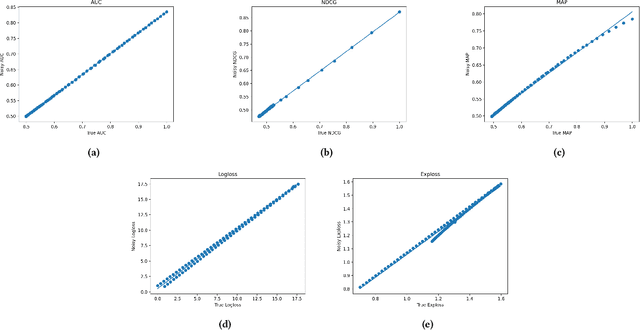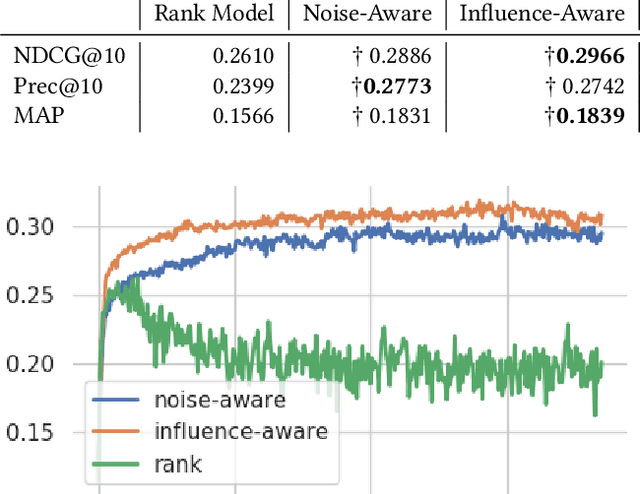Dany Haddad
AstaBench: Rigorous Benchmarking of AI Agents with a Scientific Research Suite
Oct 24, 2025Abstract:AI agents hold the potential to revolutionize scientific productivity by automating literature reviews, replicating experiments, analyzing data, and even proposing new directions of inquiry; indeed, there are now many such agents, ranging from general-purpose "deep research" systems to specialized science-specific agents, such as AI Scientist and AIGS. Rigorous evaluation of these agents is critical for progress. Yet existing benchmarks fall short on several fronts: they (1) fail to provide holistic, product-informed measures of real-world use cases such as science research; (2) lack reproducible agent tools necessary for a controlled comparison of core agentic capabilities; (3) do not account for confounding variables such as model cost and tool access; (4) do not provide standardized interfaces for quick agent prototyping and evaluation; and (5) lack comprehensive baseline agents necessary to identify true advances. In response, we define principles and tooling for more rigorously benchmarking agents. Using these, we present AstaBench, a suite that provides the first holistic measure of agentic ability to perform scientific research, comprising 2400+ problems spanning the entire scientific discovery process and multiple scientific domains, and including many problems inspired by actual user requests to deployed Asta agents. Our suite comes with the first scientific research environment with production-grade search tools that enable controlled, reproducible evaluation, better accounting for confounders. Alongside, we provide a comprehensive suite of nine science-optimized classes of Asta agents and numerous baselines. Our extensive evaluation of 57 agents across 22 agent classes reveals several interesting findings, most importantly that despite meaningful progress on certain individual aspects, AI remains far from solving the challenge of science research assistance.
Ai2 Scholar QA: Organized Literature Synthesis with Attribution
Apr 15, 2025Abstract:Retrieval-augmented generation is increasingly effective in answering scientific questions from literature, but many state-of-the-art systems are expensive and closed-source. We introduce Ai2 Scholar QA, a free online scientific question answering application. To facilitate research, we make our entire pipeline public: as a customizable open-source Python package and interactive web app, along with paper indexes accessible through public APIs and downloadable datasets. We describe our system in detail and present experiments analyzing its key design decisions. In an evaluation on a recent scientific QA benchmark, we find that Ai2 Scholar QA outperforms competing systems.
OLMES: A Standard for Language Model Evaluations
Jun 12, 2024



Abstract:Progress in AI is often demonstrated by new models claiming improved performance on tasks measuring model capabilities. Evaluating language models in particular is challenging, as small changes to how a model is evaluated on a task can lead to large changes in measured performance. There is no common standard setup, so different models are evaluated on the same tasks in different ways, leading to claims about which models perform best not being reproducible. We propose OLMES, a completely documented, practical, open standard for reproducible LLM evaluations. In developing this standard, we identify and review the varying factors in evaluation practices adopted by the community - such as details of prompt formatting, choice of in-context examples, probability normalizations, and task formulation. In particular, OLMES supports meaningful comparisons between smaller base models that require the unnatural "cloze" formulation of multiple-choice questions against larger models that can utilize the original formulation. OLMES includes well-considered recommendations guided by results from existing literature as well as new experiments investigating open questions.
Noise tolerance of learning to rank under class-conditional label noise
Aug 03, 2022

Abstract:Often, the data used to train ranking models is subject to label noise. For example, in web-search, labels created from clickstream data are noisy due to issues such as insufficient information in item descriptions on the SERP, query reformulation by the user, and erratic or unexpected user behavior. In practice, it is difficult to handle label noise without making strong assumptions about the label generation process. As a result, practitioners typically train their learning-to-rank (LtR) models directly on this noisy data without additional consideration of the label noise. Surprisingly, we often see strong performance from LtR models trained in this way. In this work, we describe a class of noise-tolerant LtR losses for which empirical risk minimization is a consistent procedure, even in the context of class-conditional label noise. We also develop noise-tolerant analogs of commonly used loss functions. The practical implications of our theoretical findings are further supported by experimental results.
Learning More From Less: Towards Strengthening Weak Supervision for Ad-Hoc Retrieval
Jul 19, 2019

Abstract:The limited availability of ground truth relevance labels has been a major impediment to the application of supervised methods to ad-hoc retrieval. As a result, unsupervised scoring methods, such as BM25, remain strong competitors to deep learning techniques which have brought on dramatic improvements in other domains, such as computer vision and natural language processing. Recent works have shown that it is possible to take advantage of the performance of these unsupervised methods to generate training data for learning-to-rank models. The key limitation to this line of work is the size of the training set required to surpass the performance of the original unsupervised method, which can be as large as $10^{13}$ training examples. Building on these insights, we propose two methods to reduce the amount of training data required. The first method takes inspiration from crowdsourcing, and leverages multiple unsupervised rankers to generate soft, or noise-aware, training labels. The second identifies harmful, or mislabeled, training examples and removes them from the training set. We show that our methods allow us to surpass the performance of the unsupervised baseline with far fewer training examples than previous works.
 Add to Chrome
Add to Chrome Add to Firefox
Add to Firefox Add to Edge
Add to Edge